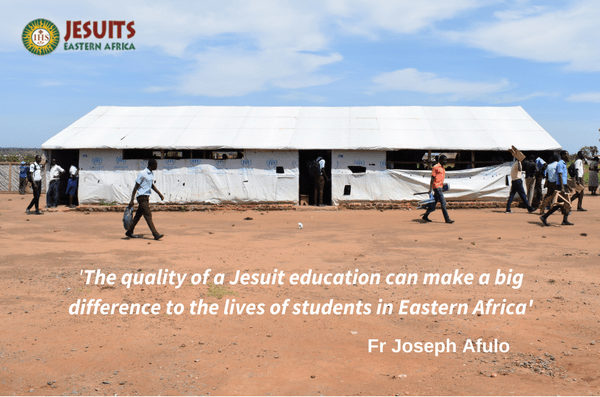
The Provincial of the Eastern Africa Jesuits, Fr Joseph Afulo made a stopover in Dublin for a few days in February, on his way to the USA. He spent some time with us in the missions office and discussed topics that are of concern in six countries that comprise the Province which are Kenya, Tanzania, Uganda, South Sudan, Ethiopia and Sudan.
South Sudan
The Eastern Africa Province is a large and diverse area, and each of the countries in it has its own set of opportunities and challenges. However, the ongoing civil conflict in South Sudan, which shows no sign of reaching an end is a primary concern for the region. Violence and instability in what is the world’s youngest country has resulted in millions of people fleeing their homes and villages to find safety and food in camps within its borders or in neighbouring countries like Uganda which is now home to more than one million South Sudanese refugees.
One of the consequences of the conflict has been severe inflation and the devaluing of the South Sudanese currency, which has had a detrimental effect on most people in the country and also on institutions like the Jesuit-run Loyola Secondary School in Wau. The school has 700 pupils but families of students can no longer afford the school fees, which are priced in dollars. To get a sense of the enormity of the increase, Fr Afulo explained that five years ago, $1 (US Dollar) was equivalent to £3 (South Sudanese Pounds). Now the rate is $1 converts to about £100, making school fees of $200, (which used to convert to £600 in South Sudanese currency) now £20,000.
{youtube}OjMwEwpFw1c{/youtube}
The war has also increased the cost of travelling to the region. This has risen because of the damage to infrastructure and high insurance costs that the fighting has resulted in. It is now less expensive for Fr Afulo to reach Europe than to travel to South Sudan from his home in Kenya and it is probably a safer journey too.
The conflict in the region shows little sign of being resolved soon, as interclan fighting is now a bigger problem than the initial clash between the government and anti-government forces. There is no sanctuary or immunity from attack for civilians in this war; medical or NGO staff or clergy are not off-limits to being attacked or killed. One of the biggest tragedies of the fighting is the conscription of children into armed gangs. Fr Afulo told us of child soldiers who are embroiled in the conflict and are armed with AK-47 automatic rifles.
There are currently twenty Jesuit missionaries in South Sudan; including eight in Wau, two in Juba, and four in Rumbek. An Irish Jesuit, Tony O’Riordan left just last month to take over as Project Director in Maban in the northeast of the country. These men work in conjuction with laypeople and with other religious orders to deliver aid and services to people in the most effective way possible.
Priorities of the Province
Fr Afulo outlined the overall priorities for the Province in the immediate future, in light of the challenges in the region and the focus of the Eastern Africa Jesuits.
- Education – This is a key priority. It is necessary because the quality of State education in the six countries of the East Africa Province is of poor quality. In contrast, the quality of a Jesuit education and Ignatian pedagogy can make a big difference to the lives of students enrolled in those schools. In South Sudan, more than 65% of all refugees are under 18. Students from these camps who come to class often have not even eaten that day, and so in addition toschooling these projects offer food and safety. Fr Afulo sees education as the only hope for children to escape the poverty and violence they are living with.
- Spiritual Retreats – Making spiritual exercises available to people is also a key focus of the Province. There is a retreat house in Ethiopia which is popular not only with Jesuits and Catholics but as an ecumenical environment, open to people of other faiths. Fr Afulo is keen to provide a retreat centre in South Sudan to give a place of respite for missionaries who are working tirelessly to attend to the problems there, as high travel costs and a lack of time prevent them from going into neighbouring countries to access one.
Irish Jesuit Missions, April 2018

